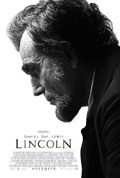
Directed by
Steven Spielberg
150 minutes
Rated M
Reviewed by
Bernard Hemingway

Lincoln
Synopsis: An account of President Abraham Lincoln's battle to end slavery in America.
Although the title of Spielberg's film suggest that is it a bio-pic, much like the currently screening Hitchcock it instead focusses on a brief but crucial period in its subject’s life. In this case it is January 1865 and Lincoln’s all-out struggle to get the 13th Amendment to the American Constitution passed in the House of Representatives, thus abolishing slavery.
Scripted by Tony Kushner, who wrote Spielberg’s 2005 film Munich, and based on the book Team of Rivals: The Political Genius of Abraham Lincoln by Doris Kearns Goodwin, it is a detailed account of the political machinations involved in getting the amendment passed against considerable opposition on both sides of the House. Although the Civil War plays out in the background, bar one brief but effective battle scene, the film offers no action but rather documents an intense and complex battle of wills fought between many adverseries.
Formally the film owes much to the Ken Burns style of documentary making which unpacks history through a detailed examination of the archives and brings it to light by combining images and texts of the time. Indeed seeing Lincoln is very much like seeing such material come to life, complete with unattractive facial hair and archaic speechifying. Whilst this requires close attention to follow the ins and outs of the workings of the American political system of the time the film also explores Lincoln’s personal life, in particular, his relationship with his wife, Mary (Sally Field) and oldest son, Robert (Joseph Gordon-Levitt) as he struggles with divisions in his home as well as on the political front.
As with the Hitchcock portrait, Lincoln very much plays to the public image of the man, although unlike the tubby film director, the iconic president is portrayed with keen admiration as a folksy visionary with a relentless allegiance to his principles and a canny sense of political realities. Myth-making rather than critical deconstruction is what Spielberg's sensibility is best suited to and he does it here with convincing results .
If as a slice of re-created history Lincoln feels impressively thoroughgoing (although apparently one significant gaffe is that Connecticut did not vote against abolition as is shown here), this would not sustain on the big screen without Daniel Day-Lewis’s flawless title performance. It is as if the iconic image of the President we all know from his famous memorial in Washington came to life and in the short time before resuming its graven posture we were able to witness the living, breathing human being re-enact those last few days of his life for us (the film also jibes very well with the Lincoln of John Ford's 1939 bio-pic, Young Mr Lincoln). It is a marvel to behold and unless there is some kind of brain-freeze in the Academy, one which surely will earn Day-Lewis his third Best Actor Oscar. If that is sufficient reason to see the film, there are also impressive performances from Tommy Lee Jones, Hal Holbrook, David Strathairn and an unrecognizable James Spader whilst Sally Field plays a small but very effective role as Mrs Lincoln.
Spielberg has foisted more than his fair share of puerile rubbish on us over his long and enormously successful career. Lincoln atones for a goodly slice of it and shows how good a film-maker he can be. Perhaps, for all its celebratory tone, it is too serious-minded for the Best Picture or Best Director Oscars but it will certainly be on everyone’s short-list.
FYI: Daniel Day-Lewis did indeed win the Best Actor Oscar but the Best Picture went to the historically compromised Argo and Best Director to Ang Lee for Life Of Pi. It did, however, win Best Production Design,

Want more about this film?


Want something different?




